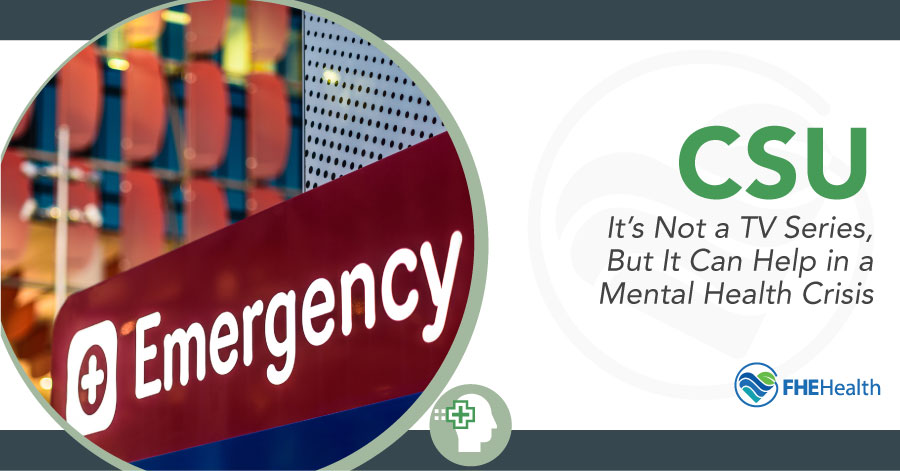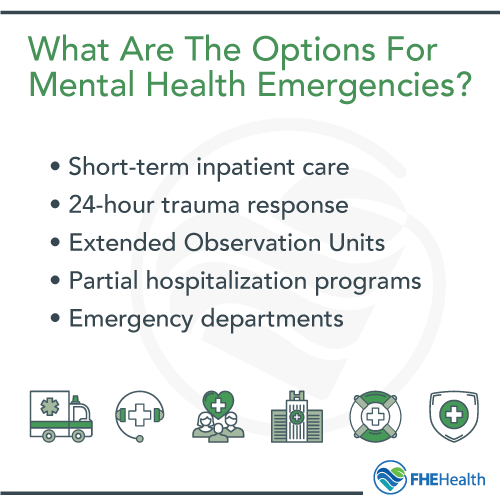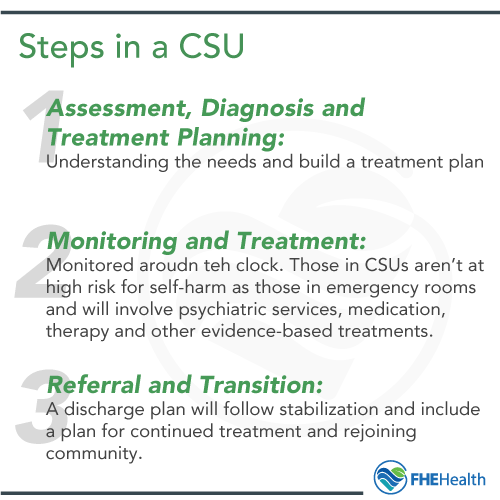
In the landscape of addiction and mental health treatment options, you’ll come across a variety of acronyms. One, which you may or may not have heard, is a CSU: crisis stabilization unit. This is a specialized treatment setting where people with more severe mental health needs can get the treatment they need on a case-by-case basis.
Because CSUs fit into the diverse range of options for people needing mental health care — more specifically, inpatient, residential mental health care — we feel the need to explain what they are and how they are able to provide positive outcomes for some mental health patients.
With this in mind, FHE Health doesn’t offer a CSU of its own. Our team will be happy to help guide you to the care you need, even if it’s not something we provide at our facilities.
What Is a Crisis Stabilization Unit (CSU)?
 There are a variety of different options for people with mental health disorders to get the help they need. According to the National Institute on Mental Illness (NAMI):
There are a variety of different options for people with mental health disorders to get the help they need. According to the National Institute on Mental Illness (NAMI):
- Less intensive options like 24-hour crisis hotlines and walk-in crisis centers for people having a psychiatric emergency that need help immediately
- Short-term inpatient care — respite care for caregivers in crisis and 24-hour trauma response can be a better option for some patients
- Extended Observation Units (EOU) when a crisis can be resolved in 24 hours or less
- More intensive options including full or partial hospitalization programs aimed at helping patients in crisis in a clinical setting
- The use of emergency departments, usually when psychiatric trauma is especially severe or life-threatening
In between short-term care and full inpatient rehabilitation exists another option: a crisis stabilization unit. A CSU is a small, inpatient facility that offers 24/7 care for patients experiencing a psychological crisis. The goal of these settings is to provide care around the clock, stabilize the patient and get them back into the community as quickly as possible.
CSUs are excellent options for those seeking an additional level of intensive care when they or a loved one are in a mental health crisis. These settings represent quality, consistent care and the commitment towards recovery — or at least stabilization so that efforts to see recovery can begin in full at another location.
How CSUs Are Talked About
In 1963, John F. Kennedy signed the Community Mental Health Act, meant to take the burden of providing mental health care off of institutions and hospitals and give community organizations and private businesses the opportunity to provide better, more comprehensive care.
Since then, the options (as shown above) for inpatient and outpatient mental health treatment have exploded, covering every part of the spectrum of mental health needs, ranging from patients who need some psychiatric support to cope with their lives to patients needing immediate intervention in a severe case.
However, the concept of CSUs may not be familiar to those without experience in the mental health field. CSUs are also referred to as crisis stabilization centers, part of a larger category of crisis stabilization services. (The latter is very similar to the above breakdown from NAMI).
Steps Taken in a CSU
 While the role of a CSU in the broader range of emergency mental health services varies between facilities, these settings usually follow a certain path:
While the role of a CSU in the broader range of emergency mental health services varies between facilities, these settings usually follow a certain path:
- Step 1 – Assessment, Diagnosis and Treatment Planning: The first thing that happens when you enter a CSU is your assessment. The best way to stabilize you when you’re undergoing a psychiatric emergency is to understand your needs and build an abbreviated treatment plan to address them as quickly and efficiently as possible.
- Step 2 – Monitoring and Treatment: In a CSU, patients are monitored around the clock. While people admitted into a CSU are not as high a risk for self-harm and further trauma as those who go into a hospital emergency room, for example, treatment must still be heavily monitored. The treatment itself may range from standard psychiatric services, medication, group therapy and other evidence-based treatments.
- Step 3 – Referral and Transition: Once you reach the end of your time in a CSU, you should be stabilized and ready to rejoin the community. The treatment staff at your CSU facility will likely recommend the best next steps for a safe and healthy recovery.
Who Is a Good Fit for a CSU?
A CSU is intended to bridge the gap between hospitals and extended inpatient care and purely outpatient mental health intervention. It can be a good fit for those beginning to slide down into more and more severe behaviors without the need for full hospitalization for their conditions.
The Relationship Between CSUs and Addiction
While CSUs don’t treat addiction necessarily, many people have co-occurring disorders, and along those lines, many crises involve drugs and alcohol. While a CSU or another short-term solution isn’t an effective replacement for the full continuum of care in addiction treatment, it can be a way to bridge the gap and stabilize a person for more intensive treatment in the future.
A good CSU staff can help patients with more than just psychiatric issues, and addiction is definitely within the range of issues that a qualified crisis team can address.
Don’t Wait to Get Help
Patients who come to FHE Health to get treatment for mental illness occupy a wide range of different treatment needs. Sometimes, they come to us after already spending at least one stint in some type of crisis center, and other times, they may be a better fit for a CSU or similar treatment setting than they are for a residential mental health treatment facility like the one we operate.
No matter what you think is the best for your case, we encourage you to continue reading up on your options. If you’re not sure what type of care to get started with, contact FHE Health and learn about all your options.






